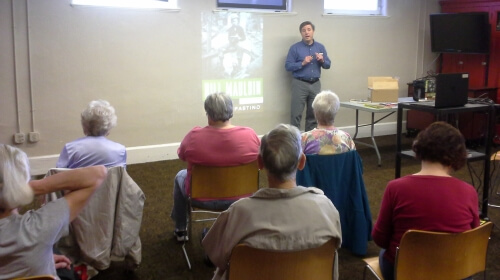A few weeks ago, local scholar Todd DePastino visited the West Pittsburgh History Club to give a presentation of his work with local veterans. Not simply an academic, Todd’s work with veterans extends outside the tower through the Veteran’s Breakfast Club, a group he co-founded.
The aim “is to capture, preserve, and share these stories with the public so that this important history will never be forgotten.” Check out the website if you want to listen to some of these stories. Or, participate in person by attending a Veteran’s Breakfast Club event — all are welcome.

Todd did not begin his career as a student of military history or with the intent to study veteran affairs and identity. Curiously it began with a project published as Citizen Hobo: How a Century of Homelessness Shaped America. Clearly, Todd had a grounding in 20th century American History and his research for Citizen Hobo gave him enough background regarding life on the road to write and introduction for 2006 edition of Jack London’s The Road.
But Todd’s scholastic shift to military history came when he was looking for a new research topic, and a friend suggested he look at the cartoons of Bill Maudlin – an artist who got his start during World War II when, as an enlisted rifleman, he began sketching cartoons about life during wartime as experienced by enlisted men. Their rough language and visage appeared natural to a scholar who had just spent a significant amount of time examining homelessness. Having found his topic, Todd immersed himself in the story of Bill Maudlin.
Maudlin’s style matured as he aged, but the constant thread that wove his work together were two soldiers — Willie and Joe, dog-faced stand-ins for American G.I.s. Though these characters don’t appear in every cartoon, Willie and Joe came to represent life in the European theatre where Maudlin himself was stationed (he participated in the invasion* of Italy).
Maudlin, their creator, became a hero. He had a flair for toeing censorship during the war — suggesting the horrors of combat with his illustrations of bombed out cities and irreverent dialogue that certainly pissed off General Patton, but endeared him to the enlisted men who read him. Flipping through a collection of his WWII cartoons published as Willie and Joe: The War Years, I was struck at times by how much the cartoons said with one line of dialogue and a penciled background. (Check out Willie and Joe: Back Home if you want to see how those two characters acclimated to civilian life.)
Whether he was butting heads with General Patton during WWII over Patton’s strenuous nature and desire for censorship, opposing segregationists in the early-sixties or embracing the counter-culture of the late-sixties as he witnessed the folly of federal policy during the Vietnam War, Maudlin made a career of standing up for the little guy.
Maudlin’s wit would not desert him after the war as he forged a career out of his wartime activity. Ever the “mix of Jeffersonian Conservative, Populist, Libertarian” who would probably resist such labels, Maudlin never became attached to a political party or desired to be described as a conservative or liberal (Bill Maudlin: A Life Up Front, A Biography with Illustrations, 300).
I think the only honest evaluation of Maudlin’s politics would be to call him a rebel. Whether he was butting heads with General Patton during WWII over Patton’s strenuous nature and desire for censorship, opposing segregationists in the early-sixties or embracing the counter-culture of the late-sixties as he witnessed the folly of federal policy during the Vietnam War, Maudlin made a career of standing up for the little guy.
Todd DePastino does Maudlin justice with his biography. When asked what it takes to write a successful biography, Todd answered “a cooporative family.” Apparently Maudlin’s ex-wives and children did not want Todd to shy away from Maudlin’s faults — they wanted history done right. None of that glorification crap. True to Maudlin’s style.
*To use period-appropriate U.S. Government approved parlance — Maudlin participated in the “liberation” of Italy.
Interested in local history? Join up with the West Pittsburgh History Club that meets at CLP – West End every third Thursday of the month from 11 am to 12:30 pm.
Feeling rebellious?
Check out Willie and Joe: The War YearsCarl studied history at Duquesne University, where he eventually earned an M.A. in Public History. Currently he is a Library Assistant at CLP – West End.
